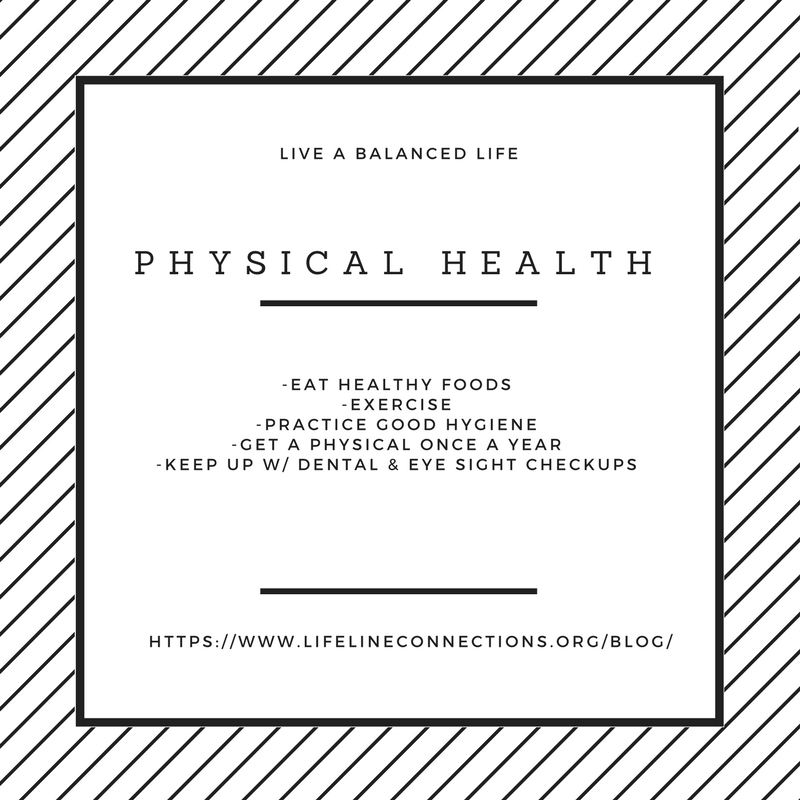
Live a Balance Life: Physical Health
This month I will be discussing four areas of your health that we can all commit to keeping healthy this year. Starting with physical health, then social health, emotional health, and mental health. The goal this year is to just live a balanced and therefore meaningful and enriched life where no aspect of your well-being goes neglected. The reason for this has to do with developing healthy habits all around. You may find that it is easier to focus in on one thing, but these kicks of improvement can be short-lived if it isn’t incorporated into your everyday lifestyle.
Why?
Living physically healthy can deter many future problems as well as help you overcome current physical ailments. Aside from being physically fit, there are many reasons why the Center for Disease Control CDC suggests that you incorporate at least a 10-minute high energy physical routine into your daily schedule. Physical fitness helps your body increase its oxygen flow and improves your endurance. It helps you sleep better, encourages healthier eating, and motivates you to accomplish more during the day. But exercise is only a part of what it means to be physically healthy. Eating according to your health needs, sleeping the recommended amount of hours per night, and taking care of yourself when you are sick are all ways that you keep yourself healthy.
How?
For some insight about what is considered optimal or normal health practices, I often refer to the Center for Disease Control. The CDC has a myriad of research as well as very capable people who have worked in the industry for years. On the website CDC.gov are a number of topics related to the health of individuals and communities. Among the individuals and exercise, there are also specific recommendations depending on what your stage of life is. As for the general adult, it is recommended that each adult spend at least 2 hours and 30 minutes every week participating in moderate aerobic activity. Moderate aerobic activity can mean brisk walking, swimming, or bicycling- or something similar that you might prefer. It is also recommended that each adult spend at least 2 days a week doing some sort of muscle-strengthening activity.
Besides the exercise, there are other important ways to take care of yourself physically. For example, even with proper exercise your body may not start feeling better until you change your diet to something more suitable for your active lifestyle. Constantly eating processed foods, foods high in fat and calories but low in nutrients, and dehydration are all sure-fire ways to start feeling like your lagging behind. Moderation and variety in your diet are important, as is eating to your body type. Although the average recommended caloric intake is 2,000 calories a day that is an estimate that doesn’t apply to very many people. In fact, shorter, smaller, and less active people have much lower recommendations for caloric intake. Keep this in mind as you evaluate the goals you have for the year to improve your physical well-being.
Proper hygiene is another way to think of how you can improve taking care of yourself. Regularly washing your hands helps prevent many sicknesses, and showering often with soap aids your body in its natural exfoliation as well as keeping your natural body oils in balance. Having a consistent schedule helps keep your hair and skin healthy. Keep in mind that not everyone needs to shower every day as this and water that is too hot can lead to eczema or even throwing off the natural balance of your oils. Take a few weeks to try a couple of different schedules and find what works for you to keep you clean while also avoiding over doing it. Brushing your teeth twice a day not only prevents cavities, but many other mouth diseases that could cause loss of teeth and gums later in life.
In any case, try to get a physical at least once a year with a dental check up every 6 months or so depending on what your dentist recommends. Getting an opinion from your doctor about healthy habits that are more fitted to your body’s needs will benefit you in so many ways.
Lifeline Connections is a mental health and substance use treatment center that creates customized services for the residents in the Vancouver, WA and Portland, OR areas. One of our many services includes our detoxification program. We have professional medical staff on hand to help you and your body through the process of flushing out the harmful and addictive substances. We help you stabilize and then provide you with information for getting future treatment to avoid and ultimately stop using altogether. If you have any questions or are ready to get help, contact us at 360-397-8500 or email [email protected].
